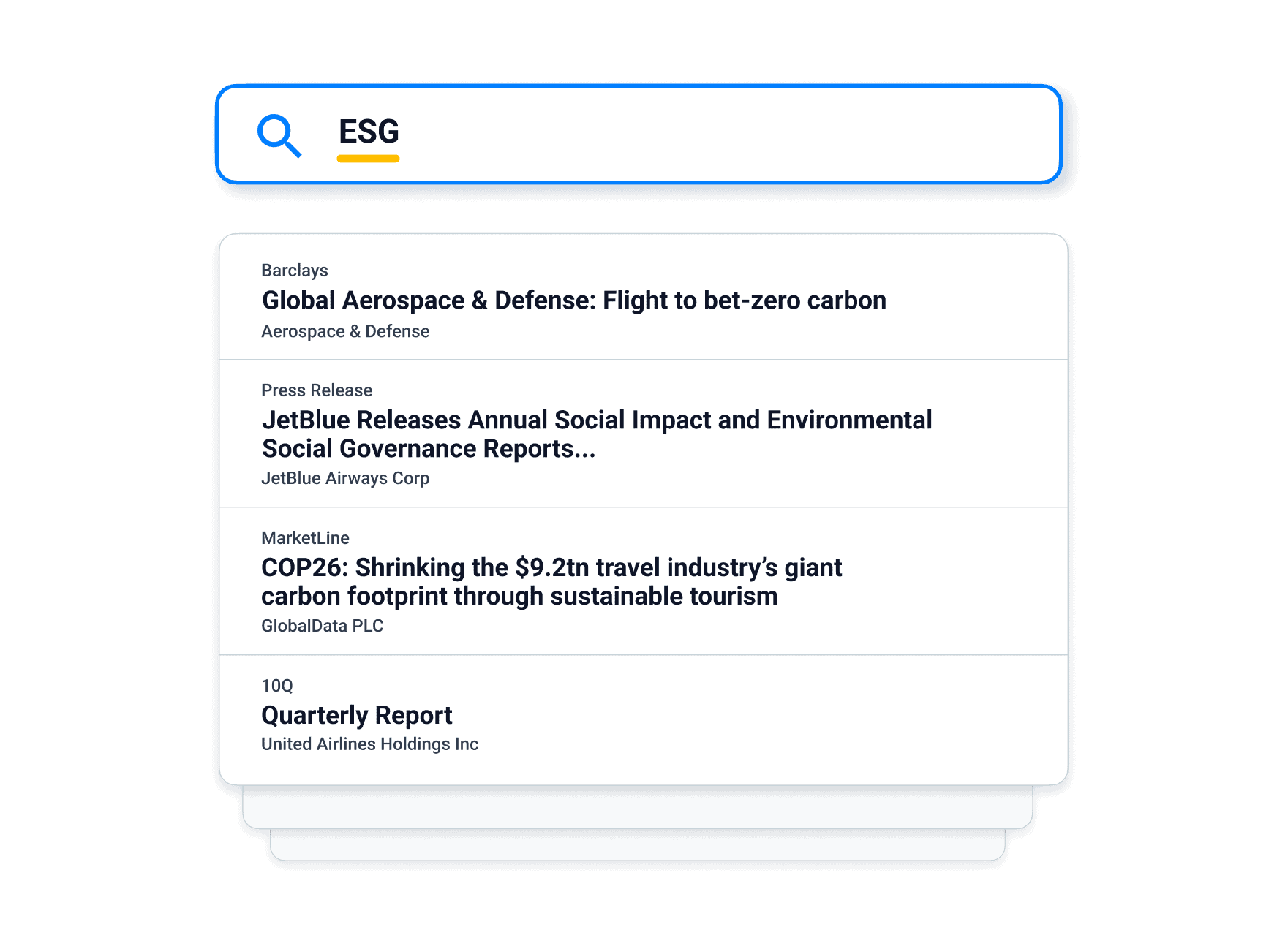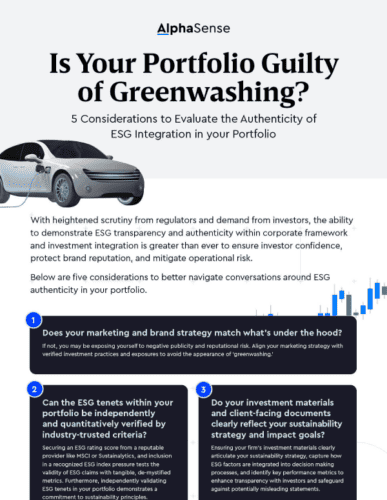Understanding ESG Investing
What is ESG investing, and why does it matter?
ESG simply stands for environmental, social, and governance, but more specifically, the acronym refers to the policies corporations instill to address the environmental toll, social issues and work environment, as well as the corporate governance associated with its operations.
These policies and whether corporations choose to be “ESG-oriented” have become increasingly important for companies, consumers, and investors in recent years. Not only have government and regulatory agencies increased their scrutiny on companies whose operations negatively affect the environment, but also those who have falsely instilled ESG policies to gain investor interest.
For companies, effective ESG policies can be demonstrated and achieved in the following ways:
- Environmental – Taking proactive measures to mitigate the environmental consequences stemming from your operations, as well as taking steps to establish eco-friendly practices through net-zero initiatives, eliminating waste, or planting trees
- Social – Ensuring that a corporation’s employees work in a safe environment, and are provided with opportunities for career growth and enrichment. Additionally, leadership can participate in advocating for the human rights and social causes important to their employees.
- Governance – Prioritizing diversity in leadership, optimizing how leadership responds to and interacts with shareholders, and ensuring a fair boardroom structure and dynamic
For investors, creating a successful ESG investment strategy means investing in companies that authentically and consistently demonstrate their ESG principles. Ultimately, investing in eco-conscious companies proves to be a great risk management tactic for investors, as an ESG score serves as an indicator of potential risk within a company’s operations and provides protection from potential regulatory discourse.
Studies have shown that companies with strong ESG performance tend to financially outperform companies with low ESG ratings—likely due to better operational efficiencies, better brand reputation, and reduced regulatory and legal risks.
Evaluating ESG Factors
As standardized practices for ESG reporting slowly emerge, companies in the meantime disclose specific criteria and metrics that investors and stakeholders use to evaluate ESG adherence.
Common metrics companies use to track, demonstrate, and report on their ESG credentials include:
- Carbon footprint reductions
- Energy efficiency improvements
- Diversity in leadership and workforce
- Employee health and safety
- Social factors like diversity and inclusion
Other metrics typically disclosed include carbon emissions and waste management, as well as energy, water, and land use. On the financial side, metrics relative to revenue, costs, assets, liabilities, and capital allocation could play a crucial role in evaluating performance.
Some of the most widely used ESG metrics are those issued by the GRI (Global Reporting Initiative), SASB (Sustainability Accounting Standards Board), GHG (Greenhouse Gas Protocol), and MSCI. Each of these metrics has a different focus, from a company’s global impact to how ESG factors affect a company’s financial performance.
In order to invest in authentic ESG companies, investors must review these metrics with a critical eye,as greenwashing and a lack of standardized reporting allows for nefarious companies to , to mislead potential investors. The key to navigating ESG benchmarking and investing is, simply, transparency.
That is why it is crucial to have a market intelligence platform like AlphaSense that aggregates ESG content from 10,000-plus trusted sources in one place so as to help you quickly separate meaningful insights from the irrelevant noise.
Evaluating ESG Opportunities With AlphaSense
The current lack of standardization of ESG reporting means investors have to spend countless hours manually parsing through paywalled websites and outlets to find information they need.
But with the AlphaSense platform, you spend less time on fruitless search and more time on strategy and analysis through our vast content universe and advanced AI search technology.
Check out our interactive tour to see how the platform does this in real-time.
First, we eliminate the need to toggle between multiple websites and sources by aggregating content across the four key perspectives of research into one single platform. These include:
- Company documents – includes ESG disclosures and documentations covering 26,000 companies, as well as company filings, press releases, and presentations
- Industry analyst reports – includes insights from top Wall Street analyst firms including Goldman Sachs, Bank of America, Morgan Stanley, and more
- Expert transcripts – includes 40,000+ first-hand perspectives from industry leaders, competitors, former employees, and customers on companies’ ESG strategy and key ESG metrics to consider
- Journalist/regulatory news – includes updates from reporting groups such as GRI and 145+ ESG-focused news and trade journals like Climate Wire, ESG Today, and ESG Investor
AlphaSense also provides exclusive insights you won’t find anywhere else by giving access to all the proprietary and premium content you need to effectively conduct your ESG research. With these exclusive sources, you can validate your findings, and back your ESG strategy with crucial Wall Street and industry expert perspectives.
We have two proprietary and premium offerings:
- Wall Street Insights® – premier collection of aftermarket research from 1,000+ top global, regional, and boutique contributors, including Goldman Sachs (never before seen in an aftermarket research collection)
- Expert Insights – provides instant access to 40,000+ interviews with thought leaders, former executives, partners, customers, and other experts
Wall Street Insights® (WSI) accelerates and streamlines your research by helping you consume the industry analyst reports you need, faster with our award-winning AI search technology. AlphaSense users never have to pay for useless information because WSI allows you to consume and pay for individual pages of reports, and our Snippet tool allows you to view relevant takeaways of the document before you purchase the page.
Our collection of industry analyst research helps our users gain a market outlook and forecast for specific areas in the energy industry (e.g., carbon capture, green hydrogen, renewable energy sources, etc.), while company documents and expert transcripts enable you to see opportunities your peers and competitors are investing in. You can also track news updates to ensure you have a pulse on any regulatory updates that could affect the ESG landscape.
Finally, our proprietary AI search technology speeds up your time to insight—effectively surfacing the most meaningful information from our vast universe content for your research.
Additionally, when you search any keyword in the platform, our Smart Synonyms™ technology immediately surfaces all relevant documents, as well as any synonyms of your search term. This feature automatically recognizes variations in language, so you never miss critical information in your search. For instance, searching “ESG” will also yield results for “governance”, “sustainability”, and “environmental”—all of which are pertinent to ESG evaluation.
Read more about how AlphaSense platform helps with ESG benchmarking in this post.
Building an ESG Strategy
Having a strategy for ESG investing is imperative, particularly as competition continues to grow in this space, and as greenwashing continues to be a rampant issue. With AlphaSense, you get access to accurate, high-quality insights that’ll help you build a winning ESG strategy.
For investors, there are four key steps for effective ESG investing:
Prioritize Transparency
To avoid putting your trust and funds in companies that make false claims about their ESG commitment, you need to verify that their organizational efforts align with their proclaimed initiatives . More importantly, ensure they are transparently reporting all relevant data.
The AlphaSense platform provides access to documents that specifically help vet companies’ ESG scores and plans, which include:
- Third-party ESG reports from JP Morgan and Deutsche Bank tracking ESG trends and growth
- Self-reported company data such as annual reports that contain specific sections for social responsibility, environmental impact, and governance
- ESG scorecards that objectively assess organizations based on specific ESG criteria
You can also use the AlphaSense platform to compare what a company is saying in their press releases to what they report in their earnings calls, in order to quickly verify their commitment to setting and reaching ESG goals.
Understand the Industry
In order to identify the right ESG targets in any industry, you need a full-scale understanding of said industry—including key industry players, main areas of focus for companies, and executive sentiment on key topics.
Creating a search for “esg” and then filtering with your specific industry of interest yields all the useful information you need to fill in the gaps on your industry knowledge and pick up on the key themes and companies you should be aware of.
Additionally, combining our natural language processing (NLP)-based feature, sentiment analysis, with our years of aggregated earnings transcripts helps you not only identify key trends but go deeper into the C-suite sentiment behind those trends.
To read about how AlphaSense helped a midstream energy investor navigate earnings transcripts more efficiently and effectively than ever before, read this case study.
Track High-Level Macroeconomic Trends
As an investor, it is critical that you stay informed on key ESG issues and on how your companies of interest discuss and respond to those issues. You also need to understand what issues are actually going to affect the market, and which are just passing fads.
For instance, let’s say you wanted to track how the Inflation Reduction Act is impacting the manufacturing industry, and in turn, how it affects ESG in manufacturing. Using our powerful search technology and relying on the four key research perspectives, you can gain a comprehensive view of this topic and understand how exactly it could impact your bottom line. From there, you can also set real-time alerts for this topic so that you never miss a crucial update and can easily monitor the situation as it unfolds.







